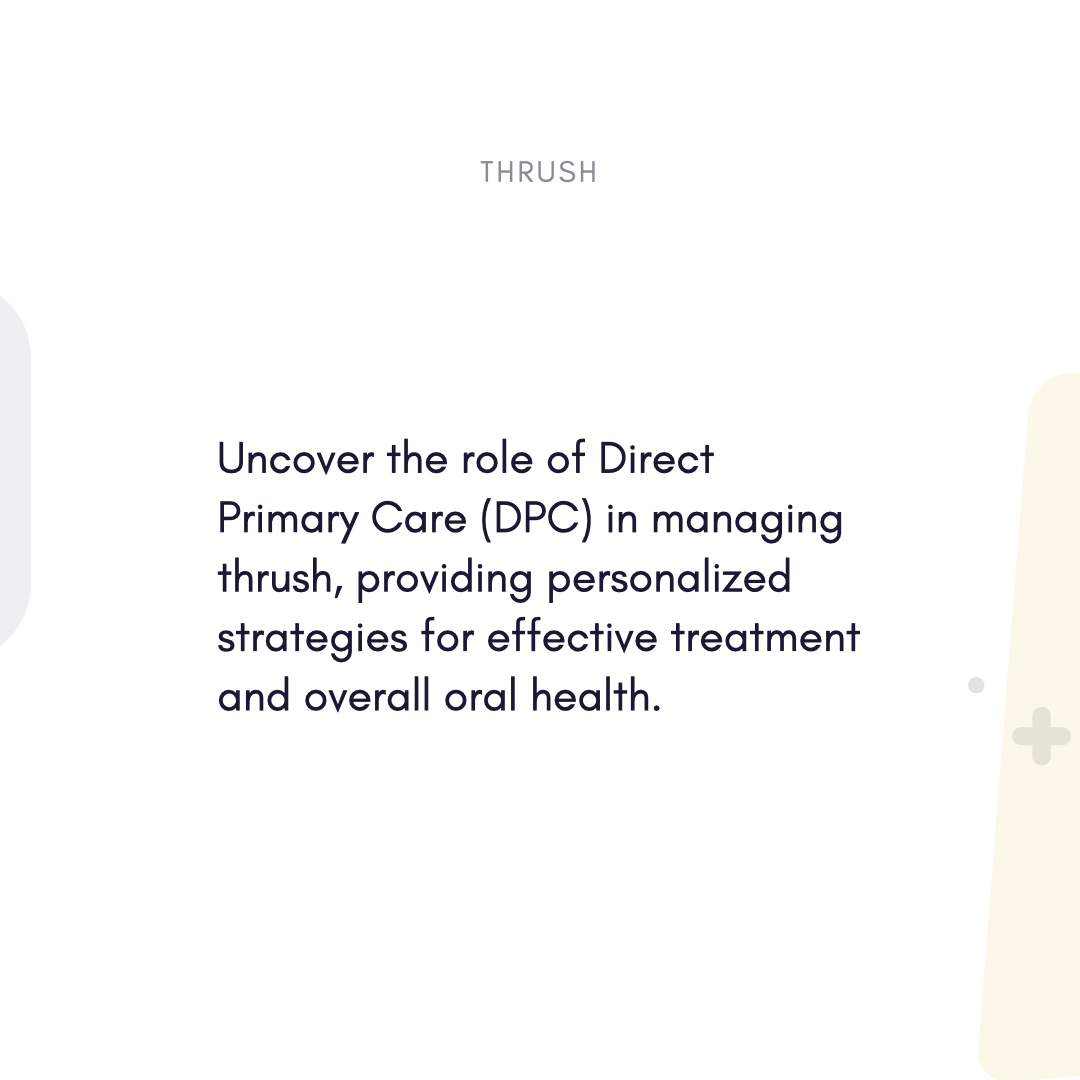Thrush and Direct Primary Care (DPC): Rapid Relief for Fungal Infections
You know how disruptive candidiasis can be if you have ever suffered the burning, cottage cheese-like patches of oral thrush or the unrelenting itching of a vaginal yeast infection. At least once, 75% of women experience thrush; 5–8% suffer recurrent episodes. Direct Primary Care (DPC) combines fast treatment, cost transparency, and techniques to prevent recurrence, so providing a simplified, patient-first approach to thrush management.

Knowing Thrush and Its Triggers
Candida overgrowth causes thrush; usually, this results from:
- Antibiotics: Killing defensive bacteria.
- Diabetes, HIV, or steroids all compromise immunity.
- Pregnancy, birth control pills cause hormonal changes.
Typical varieties:
- Thrush in the mouth: White streaks on tongue or cheeks.
- Vaginal candidiasis cause dyspareunia, itching, discharge.
- Oesophageal candidiasis: painful swallowing (in immunocompromised).
Extended cases result in:
- Secondary bacterial infections.
- Sexual dysfunction or nutritional shortages.
- Decline in quality of life.
DPC Transforms: How Thrush Hygiene
Under the membership model known as Direct Primary Care (DPC), patients pay a monthly fee—usually 50 USD–150 USD—for unlimited access to their main care physician. For thrush sufferers, this entails no surprise bills, no waiting days for relief, and treatment aimed at eradicating infection and stopping relapse.
Here's why DPC distinguishes itself:
1. Early, Evidence-Based Therapy
Following Infectious Diseases Society of America recommendations, DPC doctors also:
- Rapid diagnosis: vaginal pH tests or in-office KOH preparation.
- For oral cases, nystatin swish-and-swallow; for vaginal thrush, fluconazole.
- Azole-resistant strains call for culture-guided therapy.
2. Cost-effective, open treatment
- By providing generic antifungals at wholesale rates—such as fluconazole for 10 USD rather than 50 USD+—DPC clinics help to lower costs.
- Giving probiotics—such as strains of Lactobacillus—helps to restore microbial balance.
- Steer clear of ER visits for acute conditions using 24/7 telehealth instead.
3. Individualized Preventive Measures
Patients with continuous DPC access can:
- Using symptom journals, pinpoint triggers (such as sugar intake, tight clothing).
- Change drugs causing dysbiosis—that is, change antibiotics.
- Get dietary advice including low-sugar, high-fiber diets.
DPC Benefits for Thrush Patients
Targeted Treatment Strategies
- Each visit, DPC doctors spend 30 to 60 minutes developing plans including:
- Six months of weekly fluconazole will help to break recurrence cycles long term.
- Topical substitutes: for sensitive patients, clotrimazole creams.
- Partner treatment: Stopping couples' ping-pong infections.
Cost Reductions
- For urgent itching or irritation consultations, there are no co-pays.
- Probiotics at 20 USD a month against 50 USD+ retail.
- Avoidance of specialist fees by thorough treatment.
Integrative Health holistically
DPC tackles root causes using:
- For diabetics, blood sugar control includes HbA1c monitoring.
- Frequent infections call for zinc/vitamin C for immune support.
- Mindfulness helps to reduce cortisol, a candidate for a Candida promoter.
Personal Success Stories from Real Life
- Case 1: Emma, 28, saved 800 USD on over-the-counter treatments by ending two years of recurrent vaginal thrush with her DPC doctor's 6-month fluconazole plan and dietary changes.
- Case 2: David, 65, avoided a 300 USD ER visit by resolving oral thrush following chemotherapy by DPC-prescribed nystatin.
Common Questions: Thrush and DPC
- Q: Are men prone to thrush?
- A: Indeed! Penile candidas causes redness and itching. DPC treats partners in order to stop reinfection.
- Q: For chronic conditions, is DPC reasonably priced?
- A: Definitely. Members steer clear of urgent care markups and save 40–60% on medications.
- Q: Should a specialist be needed, what then?
- A: Discount referrals to gynecologists or infectious disease experts are coordinated by DPC doctors.
DPC Offers Thrush Patients a Win
Correct diagnosis and customized treatment are stressed by the IDSA. DPC provides this by:
- Identifying recurrences early on: avoiding complications like esophageal dissemination.
- Empowering consumers: Hygiene and trigger avoidance instruction.
- Simplifying maintenance: One monthly charge pays for unlimited follow-up and consultations.
Using DPC, break free from thrush.
Thrush need not be a nightly dream. Every swab, every pill, every step toward long-lasting relief—DPC gives you a partner who listens, acts quickly, and stresses your comfort.






